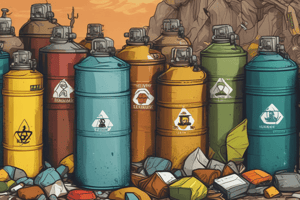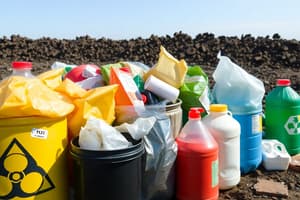Podcast
Questions and Answers
What is the significance of understanding the different types of waste (liquid, gaseous, solid, toxic, radioactive) in waste management?
What is the significance of understanding the different types of waste (liquid, gaseous, solid, toxic, radioactive) in waste management?
Understanding the types of waste is crucial for implementing appropriate management strategies, ensuring environmental protection and public health.
How does the concept of waste reduction contribute to effective waste management?
How does the concept of waste reduction contribute to effective waste management?
Waste reduction helps minimize the volume of waste generated, thus decreasing the burden on disposal facilities and reducing environmental impact.
Explain the role of recycling in the waste management process and its potential benefits.
Explain the role of recycling in the waste management process and its potential benefits.
Recycling reprocesses materials to create new products, which reduces landfill use, conserves resources, and lowers environmental pollution.
What challenges do hazardous wastes, such as toxic and radioactive waste, pose for waste management systems?
What challenges do hazardous wastes, such as toxic and radioactive waste, pose for waste management systems?
In what ways does municipal waste differ from industrial waste, and why is this distinction important in waste management?
In what ways does municipal waste differ from industrial waste, and why is this distinction important in waste management?
Flashcards are hidden until you start studying
Study Notes
Waste
- Waste is any unwanted or unusable material that results from human activities.
Liquid Waste
- Liquid waste is any waste that is in a liquid form, such as wastewater from households, industries, or agriculture.
Gaseous Waste
- Gaseous waste is any wast that is in a gaseous form, such as emissions from factories, vehicles, or power plants.
Toxic Waste
- Toxic waste is any waste that contains harmful substances that can cause environmental damage or harm to human health.
Reduction in Waste Management
- Reduction in waste management is the process of minimizing the creation of waste at its source by using less resources and promoting reusable and durable products.
Waste Management
- Waste management is the collection, transportation, treatment, and disposal of waste materials in a safe and environmentally sound way.
Radioactive Waste
- Radioactive waste is any waste that contains radioactive materials that emit ionizing radiation, which can be harmful to living organisms.
Waste Recycling (Reuse)
- Waste recycling is the process of converting waste materials into reusable products.
Filling in Waste Management
- Filling in waste management is the process of disposing of waste materials in landfills, where they are buried and covered with soil.
Municipal Waste
- Municipal waste is any waste that is generated by households, businesses, and institutions within a municipality.
Studying That Suits You
Use AI to generate personalized quizzes and flashcards to suit your learning preferences.




